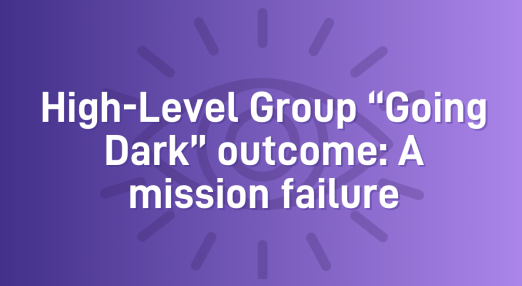surveillance
Filter by...
-

Ljubljana’s municipal surveillance: Where trust trumps data
During a Ljubljana municipal council debate on CCTV transparency, several concerning points were raised regarding the Slovenian capital's network of over 500 surveillance cameras and the methods employed to assess their effectiveness in preventing crime. The discussion revealed that the entire system relies heavily on trust in the authorities, without any substantial data to support the cameras' effectiveness or a clear rationale for their widespread deployment.
Read more
-

Building bridges for digital rights: The Civic Journalism Coalition
EDRi, EDRi member ECNL, Lighthouse Reports have launched the Civic Journalism Coalition – a space to strengthen investigative reporting, protect journalists from surveillance, and advocate for digital rights policies at the EU level.
Read more
-

The ePrivacy Regulation proposal has been withdrawn, but the fight for your privacy is far from over
The European Commission's withdrawal of the ePrivacy Regulation proposal is a major setback for privacy rights in Europe, driven by pressure from industry interests and national security concerns. However, EDRi remains committed to advocating for stronger privacy protections, challenging commercial and state surveillance in future legislative efforts.
Read more
-

Surveilling Europe’s edges: when digitalisation means dehumanisation
In May 2024, Access Now’s Caterina Rodelli travelled across Greece to meet with local civil society organisations supporting migrant people and monitoring human rights violations, and to see first-hand how and where surveillance technologies are deployed at Europe’s borders. In the first of a three-part blog series reflecting on what she saw, Caterina explains how, all too often, digitalising borders dehumanises the people trying to cross them.
Read more
-

Open letter: The dangers of age verification proposals to fundamental rights online
On 16 September, EDRi and 63 organisations, academics and experts in privacy, encryption, child safety, sex workers' rights and consumer rights issued a joint statement urging the European Commission to prioritise effective child safety measures while expressing serious concerns about the suitability, proportionality, and negative impact on fundamental rights of current age verification proposals.
Read more
-

Age against the machine: the race to make online spaces age-appropriate
The race is on to make online spaces age-appropriate, but children’s best interest is no Olympic sport. While the internet was not designed with kids in mind, children, teens and young adults are now spending more time online than ever. Parents use video-sharing platforms to show cartoons to their toddlers, while kids and adolescents play online games, engage in social media, learn through online modules, and fashion their identities through their online activities.
Read more
-

Policing by design: the latest EU surveillance plan
The EU should reintroduce mass telecommunications surveillance and create backdoors to encrypted data, a new plan drafted in secret by police and security officials says. To do so, close coordination between the state and industry would be required, to ensure what the plan calls “lawful access by design.” The plan repeats demands made many times over the years by officials, and may find a warm reception from the incoming European Commission.
Read more
-

High-Level Group “Going Dark” outcome: A mission failure
On 13 June, the Justice and Home Affairs Council, composed of EU Member States’ ministers of the Interior, will discuss the recommendations of the High-Level Group (HLG) on Access to Data for Effective Law Enforcement (“Going Dark”). This blogpost provides a short analysis of the HLG’s recommendations and a summary of its procedural flaws.
Read more
-

It’s time for a heart-to-heart about the EU’s surveillance agenda
The EU prides itself on its worldwide norm-setting influence in the fields of data protection and artificial intelligence regulation. Still, it is not always for the best when it comes to digital state surveillance. Privacy is safety. As we approach the European elections in June, it’s time to discuss the EU's role in shaping how technologies are developed and used.
Read more
-

Greek Ministry of Asylum and Migration face a record-breaking €175,000 fine for the border management systems KENTAUROS & HYPERION
On 3 April, the Greek Data Protection Authority (DPA) slapped the Ministry of Asylum and Migration with a record-breaking €175,000 fine under the General Data Protection Regulation for the border management systems KENTAUROS and HYPERION. The DPA’s investigation started back in 2022, following a strategic complaint filed by the EDRi member Homo Digitalis and its partners in Greece.
Read more
-

Mandatory fingerprints on IDs will be up for re-negotiation
On 21 March 2024, the European Court of Justice ruled the European Union (EU) regulation that enacts fingerprint IDs to be invalid for formal reasons. The principle of mandatory fingerprint collection was declared to be compliant with fundamental rights. However, the court has required a new regulation to be adopted on a different legal basis, opening up opportunities to ultimately overturn the fingerprint obligation.
Read more
-

Press Release: Brussels rocked by major spyware scandal: Urgent call for ban
Now, when push has come to shove, policymakers at the European Union (EU) must act to ban spyware in Europe. Yesterday, the media reported a major attack on EU democracy with members of the European Parliament Defense Committee being the target of phone hacking.
Read more
